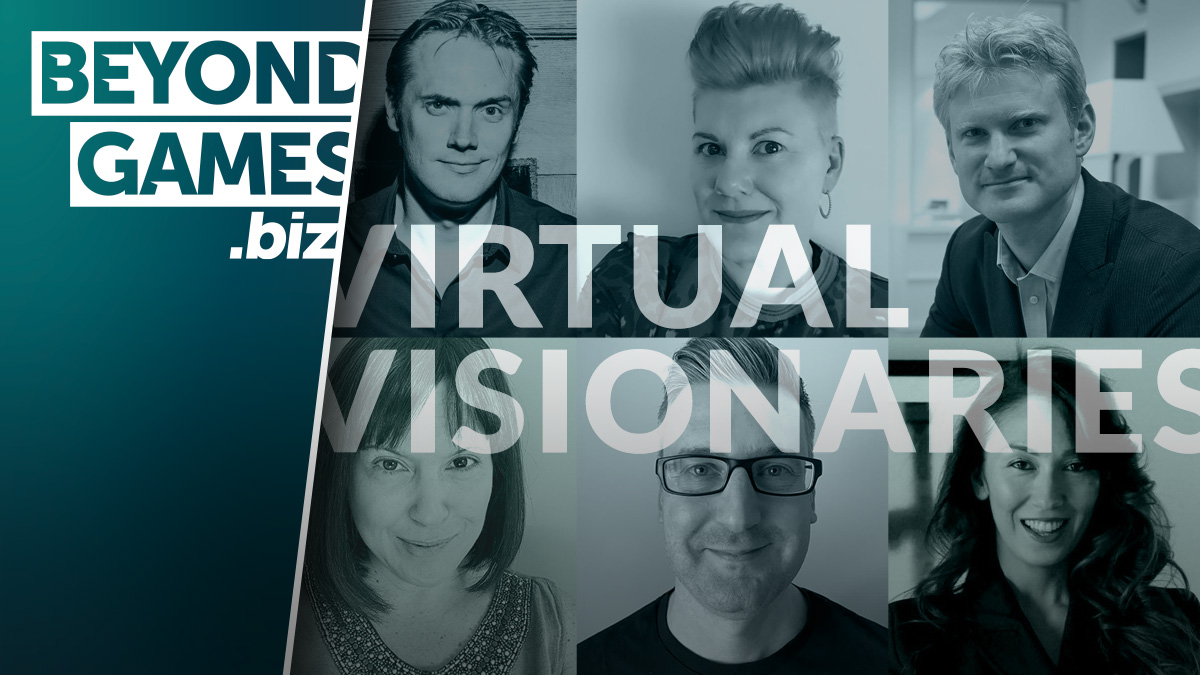When you start looking into the ongoing evolution of the global games market, and all of the ways in which it’s impacting and transforming other areas of our creative world, it becomes clear very quickly, that there’s a lot going on out there.
The metaverse, crypto, NFTs, VR, AR, XR, transmedia, applied gaming, the list goes on and on. The closer you look, the more you realise is happening and the more interesting things you find.
With so much happening, how can a humble website keep up? Simple, we have allies. When we first started planning Beyond Games, we reached out to some of the people who are making the future happen. We asked them if they’d be kind enough to join a group of fellow experts. A brain trust of artists, creators, pioneers and business leaders, we can call upon to help answer those questions that everyone is asking about the way in which we’re moving beyond games.
We call them the Virtual Visionaries. For our first question, we decided to ask them something simple.
What’s the most interesting trend in gaming right now?
Chris Hainsworth – CFO, The Game CFO:
“Developers enhancing their games through ‘accessibility first’. Accessibility is extraordinarily good for business, a cornerstone of much of Apple and Microsoft’s success in the past decade.
Accessibility is the most powerful boost to creativity that any design team could wish for. Accessibility done right does not consume resource. Accessibility efforts in digital spaces will pay dividends in the physical world. Accessibility is at the heart of the most interesting shared experiences.
Yet the gaming and XR industry risk pursuing a path that leaves millions behind, and billions of dollars on the table, because of incorrect assumptions about disability and design. The accessible metaverse is the only metaverse that counts, it’s the only metaverse that exists. A digital world that excludes people is by definition not a part of any metaverse.
If you follow Steve Saylor, Sightless Combat, Ian Hamilton and other experts you can see the rare successes in gaming, how far the industry has to go, and why efforts like Naughty Dog on Last of Us 2 are so important.”
Susan Cummings – Co-founder & Executive Producer, Tiny Rebel Games
“I think one of the most interesting trends right now is in UGC, especially game development enabled by Roblox and Core – it’s completely changing the dynamics of the industry in terms of how we think about who can develop a game and monetize it. With games played more than a billion times, over $300 million in revenue paid out last year – Roblox has become a viable platform to create and release games, completely within their ecosystem, with no traditional ‘publisher’.
We’re starting to see professional game development teams devoting resources to making Roblox games and just the other day I had a professor from a major UK university tell me that employers are looking for people with Roblox development skills and unfortunately most of the pool of talent is unemployable – i.e. 16 years old.
So I’m interested to see how much game development programs at universities start to include these tools in their courses and also, what happens when professional developers get into the mix.”
Louis Savy – Founder & Festival Director, Sci-Fi London
“As someone very new to the gaming industry, having worked in film for 20 years, I think the most interesting things happening are with the likes of MetaHuman and other virtual character systems. I see being able to play a part in a movie… to be able to switch actors in film.
New MCU movie: don’t think X is the right choice to play my fav character… No problem, go to the store and buy actor Y. Then pay a bit more and put myself in as the co-star.
Mind-blowing.
Tom Hunter – Director & Marketing Manager, Arthur C Clarke Award
“Like Louis, I’ve come at the games industry as a relative outsider (science fiction literature in my case) and the trend I’ve been tracking generally this last year, Nostalgia, is equally applicable across multiple parts of the creative industries.
We ran a 2020 reader survey that asked whether Covid-19 had changed people’s regular reading habits and 56% of respondents agreed or strongly agreed (not surprisingly) with this affecting not just how people were reading and how often, but also the types of content they were seeking out.
I’d be interested to know how gaming habits changed during the same period, and I suspect there might be interesting results to mine both in the changes and whether nostalgia gaming was a factor as well.
The creative industries are all about the next big thing off the conveyor belt, but is there more the industry could do to capitalise on latent nostalgia?
Indeed the big story of the year, Cyberpunk 2077, may look futuristic at first glance, but it’s pure retrofitted nostalgia for a late 80s/early 90s interpretation of an early 80s SF movement – a copy of a copy of a copy in other words, just with the graphic resolution getting better rather than worse.
How much of our game play is situated within nostalgic futures rather than (to mis-reference the movie, Aliens) building better worlds?”
Jon Jordan – Managing Editor, BlockchainGamer
“I would say this wouldn’t I, but I think blockchain is the key disruptive technology for many industries – including gaming – over the next decade.
Without going into massive technical detail (which I don’t even fully understand), I believe blockchain provides the entire economic layer for online activity – really it’s just internet money.
This is particularly interesting for gaming as gamers inherently understand the value of digital currencies. More significant – in the long term – however, I think such currencies will enable more circular economies in which developers and gamers have a share economic stake in success and take economic rewards from that success.
As an aside, I also think this sort of transaction value will provide momentum to gaming sectors such as esports and VR, which have yet to find solid financial models.”
Kristian Segestrale – CEO, Super Evil Megacorp
FWIW I’m actually most excited about the “meta” of what’s happening. The sheer amount of simultaneous innovation vectors and cultural evolution happening right now and how they might play together to result in really unexpected player experiences in a few years.
There could literally be a music themed, artist owned, blockchain economy based, cloud native, UGC focused, proto-metaverse with a sneaker subculture that’s into emergent theatre role play being developed for AR devices as we speak. And 100 other equally wacky combos of ideas that probably won’t work – but might just be the next insanely big thing in 2023. The tools, the funding and the opportunity is there.
For the past 20 years that I’ve been building game companies there’s always been one or two frontiers at a time – a new platform, a new business model, a new genre, a new technology etc. So innovation has felt somewhat “predictable.” We’ve mostly focused on “the next big thing” innovation opportunities / questions like:
- When will mobile gaming finally be a Billion $ business (the thing we used to ask ourselves in 2004 :P)
- When will F2P be possible on mobile? (2009 after observing it work on Facebook)
- When will genre X come to mobile? (2002-2020)
- When will PC-style competitive games come to mobile? (2013+)
- When will F2P / mobile business models come to AAA? (2015+)
- When will cross-play be possible? And who will make the first big cross-play game? (2016+)
- WTF is blockchain and how on earth will it work in games (2019+)
For all these kinds of questions it’s always felt like the high level “what” of what will happen has felt somewhat predictable – it’s just been a question of “who will do it well”, “when will it happen” and “exactly what form will it take”. And funding has typically been pretty hard to come by.
Right now I feel the landscape is fundamentally different. There are so many vectors of new things : cloud / streaming, new game engine / authoring capabilities, cross-platform opportunities, the rise of “ownership” and “stonks” culture through NFTs / blockchain, VR/AR is finally maturing, the explosion in demand for large hangout spaces like roblox and fortnite (owing a lot to Covid lockdowns) and the rapid evolution of mainstream gaming culture that crosses over with other forms of culture (music, movies etc). And so many opportunities to combo them in new and crazy ways. And it feels like there’s 10x the amount of funding and a growing amount of game company building expertise out there to explore these.
I have no idea what will be successful but getting to be part of the industry and observe all these crazy experiments, and the learnings and new ideas that they will generate will be incredible!
Kelly Vero – Creative Badass
I suppose to echo what all of you guys have been saying, the big trends are a mere touch away and yet are somehow part of what we’ve always done. It’s not as though there’s any structure in that sense to games, gameplay or tool systems but some experiences that I’ve been fortunate to experience lately have extended gameplay in meaningful ways and that really excites me as a thinker, a developer and an end-user. I especially echo some of the wider inclusivity points mentioned by some of the other advisors/geniuses.
Asia Pacific is once again taking the challenge of leading the vanguard in the psychology of gameplay as entertainment and that really excites me beyond belief. In doing so we have seen crossover IPs doing well in any platform from Honor of Kings to Amazing Cultivation Simulator (easily one of the toughest games of all time) which blends Taoist philosophy with tower defence. JD.com, T-Mall et al have been able to drive that powerful thread through these IP and become more creative by informing movements outside of current digital territories such as the current Hanfu and luxury LARPing trend and scripted “murder mystery-style” real life events where you can play an experience as your A Chinese Ghost Story character – that’s pretty much propped up by Tencent and Youku. So I guess the biggest gaming trend I see is that we are stepping ever closer to an actual life lived at our fingertips, without fear and with added WASD.
Simay Dinc – Co-Founder & Game Producer, Recontact Games
Gamers and gaming are becoming more sophisticated. New era game creations will be differentiated by the evolution of human mobile interaction. The technology will also rapidly evolve, through the increasing application of AI, AR and haptic (touch) technologies which will combine to change the consumption habits and preferences of gamers and other users.
Approaching video game development not just code writing but as apiece of interactive artwork will enable you to really feel the multidisciplinary power and impact of the industry.
Houston Howard – Super Story Optimist, One Three Creative
The most interesting trend that I see in gaming is how games, once derided as poor sources of intellectual property for Hollywood, have now become the best engine fueling not just film and television adaptation, but complete multi-platform entertainment brands. Personally, I created this change to the creative assets that come so naturally to games, which is a great storyworld. A great Storyworld creates more dynamic story potential for the brand and generates a desire for the audience to further explore and immerse themselves in the IP.
It’s so cool to see games take the preeminent stop in the core sources of Transmedia franchises. They’re finally getting the respect they deserve!
Brian has been working in the games industry since the mid-1990s, when he joined the legendary studio DMA Design, as a writer on the original Grand Theft Auto. Since then he's worked with major publishers, founded his own digital agency, and the Scottish Games Network. At various times he's worked as a journalist, editor, narrative designer, lecturer, executive producer, and director.






































